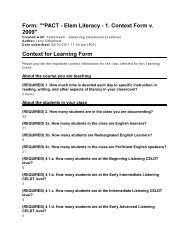The Tutoring Book - California State University, Sacramento
The Tutoring Book - California State University, Sacramento
The Tutoring Book - California State University, Sacramento
Create successful ePaper yourself
Turn your PDF publications into a flip-book with our unique Google optimized e-Paper software.
the instructor is saying, but she quickly forgets what she thinks she has heard in lecture. What this leads<br />
to is “understanding and memory fades” shortly after class ends, and later she struggles understanding the<br />
requirements of an assignment (Learning Disabilities Handbook 13). When Mari and I work together, we<br />
read over her assignments several times, and she takes notes on how she understands the assignment<br />
should be answered. Taking “good notes helps [Mari] later on take information from short-term memory<br />
and assists in rehearsing information until it is in long-term memory” (LDH 13); she needs to be able to<br />
turn to her notes or assignment in order to reflect on what her writing approach and answers will be.<br />
With Mari, reading aloud is not helpful even if the Writing Center staff encourages it. Within<br />
minutes of reading the prompt or her own writing to her, Mari will ask to have it read again because she<br />
has not been able to process what she heard; in fact, Mari will only remember the first few ideas that she<br />
heard. Also, since, Mari needs time to develop long-term memory, she benefits from explicit instructions<br />
on how to approach writing and visual aids that she can use to organize and assimilate information: she<br />
requires tips on how to write a thesis statement, when and how to insert quotes or textual information, and<br />
even what assignment formats should look like. Mari took the time to teach me about her LDs, and the<br />
result was that I was able to teach her different ways to use pre-writing for her essays and writing<br />
assignments, and she was able to repeat these instructions back to me successfully and apply them to her<br />
writing assignments.<br />
Most writers that come to the Writing Center for help know what they need to work on. <strong>The</strong><br />
students, like Mari, who have learning disabilities who come in have lived with their LDs for a long time,<br />
yet they want and need the help to succeed in the academic setting. Most LD students are aware what<br />
techniques work for them; they know their strengths and weaknesses and know how they process<br />
information when they learn. Although they are aware of their learning processes, we, the tutors, may not<br />
be. Learning disability or no learning disability, writers face many common challenges when it comes to<br />
writing; learning techniques that may successfully turn writers with learning disabilities into assertive and<br />
competent writers may very useful to writers at all stages of learning. Here are some tips that may be<br />
useful when working with an LD student or a student who might need a new approach after a few<br />
sessions:<br />
Auditory processing problems: Visual aids such as handouts, charts, Power Point presentations,<br />
overheads and for some computers work. <strong>The</strong>y need the instructions or ideas explicitly written, not<br />
spoken for them, because they require time to commit information to memory.<br />
Visual processing problems: Students here do not do well with visual aids alone. <strong>The</strong>y work well<br />
with audio such as cassettes, videos, reading aloud to them, more discussion in the tutoring session, and a<br />
quiet space where the student can concentrate on what is being said during the tutoring session.<br />
Short term memory problems: Students need to take thorough and accurate notes. Tutor should<br />
ask open-ended questions that are clear; the students then should write down the answers to these<br />
questions to be able to take another look at them later. <strong>The</strong> tutor should ask the writer to repeat back<br />
important information or points pertaining to the writing assignment, the comments on assignments, etc.<br />
Making flashcards also works well for these students. Tutors can suggest that students keep calendars or<br />
daily planners in which they write down important dates and information.<br />
Dyslexia: Students with dyslexia benefit from structured lessons. Visual and hands on<br />
assignments work well for these students. Pre-writing exercises that are structured or visual such as<br />
clustering, webbing, cubing, or outlining help students stay focused. Flashcards also work well to write<br />
down important points. Worksheets with grammar formulas, for example how to correct subject-verb<br />
57

















